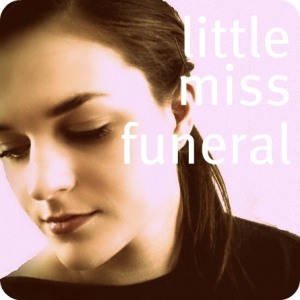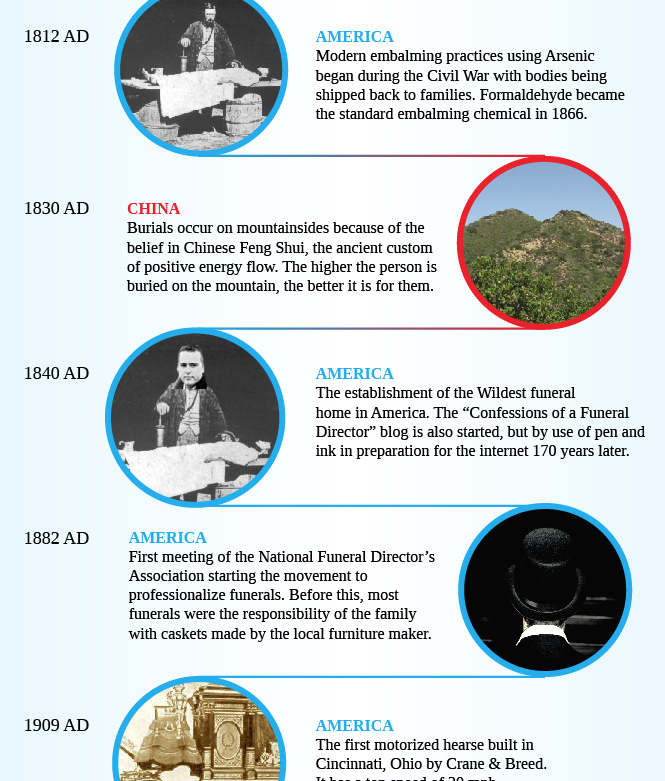Funeral Directing
The Top 5 Things You Should Know about Funeral Directors
 Today’s guest post comes from Lauren Polanski. Lauren is just like any other twenty-two year old girl besides for the small fact that she’s a licensed funeral director in New York State. Lauren is currently employed at the Lakeside Memorial Funeral Home, Inc. located in Hamburg, NY. When not working she enjoys reading, taking photographs and of course, writing about the funeral industry as seen through her eyes.
Today’s guest post comes from Lauren Polanski. Lauren is just like any other twenty-two year old girl besides for the small fact that she’s a licensed funeral director in New York State. Lauren is currently employed at the Lakeside Memorial Funeral Home, Inc. located in Hamburg, NY. When not working she enjoys reading, taking photographs and of course, writing about the funeral industry as seen through her eyes.
*****
Last week was really busy. This week hasn’t been really busy. I’ve very thankful because it’s nice to have a break every once in a while. I was even able to get a haircut this week. I don’t remember the last time I got a haircut. And it made me think, you know average people can go and get a haircut whenever they want. Average people have schedules. Average people have normal days off. I’m not average. Not many funeral directors are. I like to think we’re above average people, but maybe I’m being biased. But I did come up with a new list. So, here we go.
The Top Five Things You Should Know About Funeral Directors.
5. Funeral Directors are a little crazy.
You must have seen this coming, right? I mean, what average person wants to work with dead people? I find myself pondering this question more and more. I mean, “normal” people view death as a bad thing. We fight to live. Everyday. And here is a select group of people, who in fact have devoted their lives to taking care of the dead. Maybe one day I’ll find time to run some tests. See if funeral directors drank from the same water source. Or maybe all of our mothers ate oranges when they were pregnant. I mean, is there some kind of common connection that unites us all? Maybe I’m thinking too much into this. Because, I mean, yeah. We’re all just crazy. Simple as that.
4. Your funeral director can party harder than you.
Besides for me. I’m an exception. I can’t even party harder than your eighty-six year old grandmother. Maybe I could beat your eighty-seven year old grandfather but even that would be pushing it. But please, don’t judge us for this. Funeral directors work in a very stressful, very emotional environment. If I want to have one drink at the end of the day to wind down then sue me. And if there is a funeral director convention somewhere with a bar I am willing to bet money on the fact that the funeral directors will close the bar at the end of the night. We like to have fun, too.
3. There is no such thing as the “end of the day” for a funeral director.
You might work a nice little job in a nice little office. Maybe you come in at eight in the morning, have a lunch break around one, and clock out at 4:00 pm. When that phone rings at 3:55 pm you probably let the machine get it and think, “I’ll take care of it tomorrow.” I wish. Funeral directors are on call twenty-four/seven. Imagine it. Because, I mean, if dad dies at 4:05 pm I can’t “wait till tomorrow”. I have to take care of dad now. We get tired fast. So please, even though you’re grieving, be nice to us. We just want to help. And we may be acting on little sleep.
2. Funeral directors have a “funny” sense of humor.
I mean, this kind of ties in with us being crazy, but it’s still different. Let me go into detail. My boss bought a wine bottle holder because it looked like a casket. He also has a golf club in the shape of a coffin. So yeah, we take our job to the extreme. Oh, and we’re not above dumb jokes. We’ll be the first to tell you that “we’ll be the last to let you down” or to “party like a mortician and grab a cold one”. Some jokes can be in better tastes than others, but working in the field that we do we learn to appreciate the little jokes and funeral gadgets in life.
1. We are human.
I am a girlfriend. I am a daughter. I’m a sister, a cousin, a granddaughter, a niece. I am apart of a family. Although my career is a huge aspect of my life, it is not my whole life. I like to go to the movies. I like to go shopping. I also enjoy embalming, but I guess we all have our flaws. I guess the point I’m trying to make is this; please, remember that we’re just like you. The only difference is that I work with dead people. And contrary to popular belief, I try to go home at the end of the day. So I’m not always at the funeral home. So please, if at all possible don’t make that call at eight at night to ask about what color flowers would be best for moms wake. All the floral shops are closed by this time anyways so I can’t do anything about it. I’m probably trying to enjoy a few quiet hours by myself. Although we want to help and we love helping, being considerate when at all possible is a great thing. We bend over backwards to make a hard time easier for you. All I ask if for a little piece and quiet at night to rest up. I hope that’s not too much to ask.
*****
The other thing you should know about funeral directors … we love it when you read our blogs. Lauren’s blog — which is well worthy of your subscription — is at http://littlemissfuneral.wordpress.com/.
And the another thing … we like it when you follow us on twitter. You can follow Lauren’s personal account and her blog’s account.
Evolution of Death Infograph UPDATE
A week ago, I posted an infograph on the Evolution of Death by mysendoff.com I prefaced the infograph with this:
Although this infograph is pretty cool, it’s not entirely accurate. Between the 1830 “Feng Shui” circle and the 1882 establishment of the NFDA circle, there should be a circle for 1840 that documents the establishment of the Wildest funeral home in America. They missed that one. Just saying.
Mysendoff.com was kind enough to rectify their oversight with this addition. Well done, www.mysendoff.com. Well done.
10 Ways Funeral Directors Cope
There’s been an overwhelmingly positive response to my article “10 Burdens Funeral Directors Carry“. We funeral directors carry a unique set of burdens. And there’s ways — both positive and negative — that we cope with our burdens.
Here’s 10 coping methods funeral directors use.
The first five are coping methods that are negative or maladaptive techniques.
The last five are positive coping methods. One or more of these methods MUST be used if a person is to stay in this profession AND maintain a healthy personal and family life.
NEGATIVE COPING METHODS
One. Displacement.
Funeral service is a business that is both uncontrollable and unpredictable. Since funeral directors can’t control death and death’s schedule, we attempt to control those things and/or people that we DO have power over. We too often take out our frustrations, fears and anger on those closest to us.
Two. Attack.
And we often displace those emotions on those closest to us with some kind of aggression. In an attempt to cope and find a sense of control in our uncontrolled and unpredictable world, we will often emotionally and verbally manipulate and control our family, co-workers, employees, associates and those closest to us, making us seem nearly bi-polar as we treat the grieving families that we serve with love and support and yet treat our staff and family with all the emotional turmoil that we’re feeling inside.
Three. Emotional Suppression.
We are paid to be the stable minds in the midst of unstable souls. We withhold and withhold and withhold and then … then the floodgates open, turning our normally stable personality into a blithering, sobbing mess, or creating a monster of seething anger and rage. During different occasions, I have become both the mess and the monster. The difficulty is only compounded by the fact that you just cannot make your spouse or best friend understand how raising the carotid artery of a nine-month old infant disturbs your mind.
Four. Self-harm.
We cope with alcohol. I know a number who attempt to waste their troubles away with a bottle.
Substance abuse.
Sexual callousness. The sexual philandering that occurred in Six Feet Under was not just for higher TV ratings.
Five. Trivializing.
Compassion fatigue happens to all of us in funeral service. If we can’t bounce back from the fatigue, we begin a journey down the road to callousness. Once calloused, we tell ourselves that “death isn’t as bad as ‘these people’ are making it seem.” Once we trivialize the grief and death we see, we can easily justify charging the hell out of the families we serve.
POSITIVE COPING METHODS
Six. Benefit-finding.
The funeral business contains many burdens. Yet, the good we can do and the beauty we can find around death – if we look for it – may outweigh the darkness. Learning to see the light in the darkness of death is a positive way we can cope.
Seven. Altruism.
Learn to love serving others. Probably the best means to cope with the funeral business is found in the people we serve. Love them intentionally and don’t be afraid to find joy in meeting their needs. Don’t be afraid to hear their stories and become apart of their family.
Eight. Problem-solve.
Don’t be passive with the burdens you carry. Actively attempt to find positive ways to deal with your burden. Exercise. Eat better. Take a vacation. Go out with your friends. If you can’t shed your burdens on your own, seek counseling. Find a psychologist. Find a psychiatrist. Talk out your problems with someone wiser than you.
Nine. Spiritual Community and Personal Growth.
Using religion as an opiate to ignore reality is something I speak AGAINST on a regular basis. Instead, seek a community where there’s faith authenticity. Find people who can encourage you with their love and support as you worship together and ponder the mysteries and truths of a better world.
Ten. Avoidance.
If this business is wrecking your life and the lives of those around you, then salvage what you have left and quit this business. Quitting doesn’t make you a failure. Quitting doesn’t make you weak. You know more than anyone that you only have one life to life. Live it to its fullest by doing something that breathes life into your soul.
Funerals: Touching is Safe Here
In our culture, touch is too often motivated by
1.) Desire.
2.) Demand.
Many don’t know how to touch outside of those two categories.
There’s a rather new interdisciplinary area of study called haptonomy which explores how to touch outside of the desire and demand categories. Haptonomy is the study of psycho-tactile communication. Psychologist and hospice pioneer Marie de Hennezel writes concerning her training in haptonomy:
One develops and tries to ripen one’s human faculties of contact; one learns to ‘dare’ to encounter another human being by touch. It may seem foolish to undergo formal training in order to develop a basic human faculty. Unfortunately, the world in which we all grew up and continue to develop is one that doesn’t encourage spontaneous emotional contact. Certainly we touch other people, but that’s when the intention is erotic. Other times, the context is impersonalizing, as in the medical sphere, when one is most often manipulating ‘bodily objects.’ What is forgotten is what the whole person may feel. “
There’s touching with desire, touching with demand and — here’s a third option — there’s touching with devotion. Touching with devotion is an ardent recognition of the value of people … it’s not forceful or uncomfortable, rather it’s respectful and produces ease.
There’s one place where the humanizing, respectful and relaxing touch of devotion is seen on a regular basis.
That place is death.
We receive the phone call that so-and-so has died at their home. We put on our dress cloth, drive to the house and there awaiting us is so-and-so’s family. We walk in and instead of shaking their hands, we reach for a hug. And they reach back.
Complete strangers.
At the funeral of so-and-so, family and friends hug and kiss and embrace all day. It’s those hugs and embraces that somehow make a funeral bearable … they somehow relax the otherwise tumultuous experience of death.
The irony is that a human has to die for true humanity to be found.
*****
Mainstream medicine is catching on to the power of devotional touch.
The University of Miami conducted over 100 studies on the power of devotional touch and this is what they found: Devotional touch can: produce faster growth in premature babies
caused reduced pain in children and adults
decrease autoimmune disease symptoms
lowered glucose levels in children with diabetes
improved immune systems in people with cancer.
Other studies have show that devotional touch can
lower stress levels
boost immune systems
help migraines.
Why do we reserve the life giving power of touch only for death and funerals?
What would happen if we would daily interact with our friends and family like we were at a funeral?
10 Burdens Funeral Directors Carry
Note: I wrote this article over the weekend and I wasn’t going to publish it until Wednesday, but since I just spent my entire night [11 PM to 5:45 AM] picking up three deceased persons, I thought it’s probably appropriate to post it now. After I hit “publish”, I’ll be off to bed and back to work by noon. Ah, the joys of a small family business.
If you’re in the Parkesburg area and want to donate coffee* to my bloodstream, you’ll find me at 434 Main St.
*I prefer a medium cup of Dunkins Donuts with cream and sugar : )
*****
The following burdens are not necessarily funeral service specific, but many, if not all, come with this profession. Those of us who stay in this profession do so because we find serving others in their darkest hour extremely rewarding, yet there are burdens to be borne. Here’s ten.
One. A Lack of Personal Boundaries.
The phone rings at 3 AM in the morning with a hospice nurse on the other end of the line telling you that so-and-so has died, that so-and-so’s family is requesting your services and that the family of so-and-so is ready for you to come and pick up so-and-so.
The phone rings at 6 PM the next day. Someone needs to see so-and-so … he simply can’t believe so-and-so is dead and must come to the funeral home at once to see so-and-so.
Two. Depression.
While those of us who stay in this business do so because we love serving people, the lack of personal boundaries can lead to depression.
Depression, because my son’s baseball game was at 6 PM, but somebody in so-and-so’s family needed to see so-and-so this very minute. Depression because the emotional needs of others somehow always trump my personal life needs. And all of a sudden “I’m not a good father” and “I’m not happy with my life.”
Three. Psychosis.
Psychologist Carl Rogers described how he “literally lost my “self”, lost the boundaries of myself…and I became convinced (and I think with some reason) that I was going insane”. When we in human service, and death service, become pulled into the whole narrative of death and dying, we can lose ourselves.
Four. Smells.
An iron stomach I have not. Putrid smells, this business has many. This is a burden that comes home with me … a burden that my wife often notices shortly after I walk through the door.
Five. Life Secrets, Death Secrets and Practice Secrets.
When a person commits suicide or dies from an overdose, there are times when the family simply wants to keep the manner of death a secret from the public.
I don’t mind carrying the burden of a secret, but when you live in a small town where suspicion can run rampant, secrets can become heavy.
Some things we see will remain with us forever. They are so disturbing, so terrible that we do the world a favor by not sharing them.
Six. Isolation by Profession.
Death makes us different … not necessarily unique, just different. This difference creates a chasm between us and those not immersed in death. Sure, police, doctors, psychologist, etc. have chasms created by their professions, but ours – because of the fear, sadness and undefined hours of our practice – creates us into something other.
Seven. Death itself.
Death can be a beautiful experience in the life of a family. But when that death is tragic and unexpected, death is a heavy burden for both the family and for those who serve the family. Specifically, when the death is a young person, our entire staff becomes agitated and moody.
Eight. Workaholism.
Many funeral homes are small businesses that don’t have enough staff for shift work. In order to serve our families (so that they’ll return), we have learned that the way to overcome the depression and potential psychosis that can come with a lack of personal boundaries is to marry the business. We make the work our life. Such work addiction pleases the families we work for, but can leave our personal families destitute.
And while many of us don’t carry the burden of workaholism, we do carry the burden of fighting off the addiction.
Nine. Death Logistics Stress.
Every business has stress. Some more and some less. And while funeral service can’t claim a quantitative difference in stress, it can claim to have its very own type of stress. To grasp the type of stress surrounding a funeral, imagine planning a wedding in five days, except where there’s joy, sadness exists, and where there’s usually a bride, a dead body lies in state.
Ten. Dress clothes …
… in the summer heat. Dress clothes in the dead of winter. We are one of the few — armed service members are the only others I can think of — professions that wears suits outdoors as a matter of practice. There’s nothing like having sweat drip down your back and into your crack. Well, nothing except maybe freezing your dress shoe covered toes in a foot of snow.



